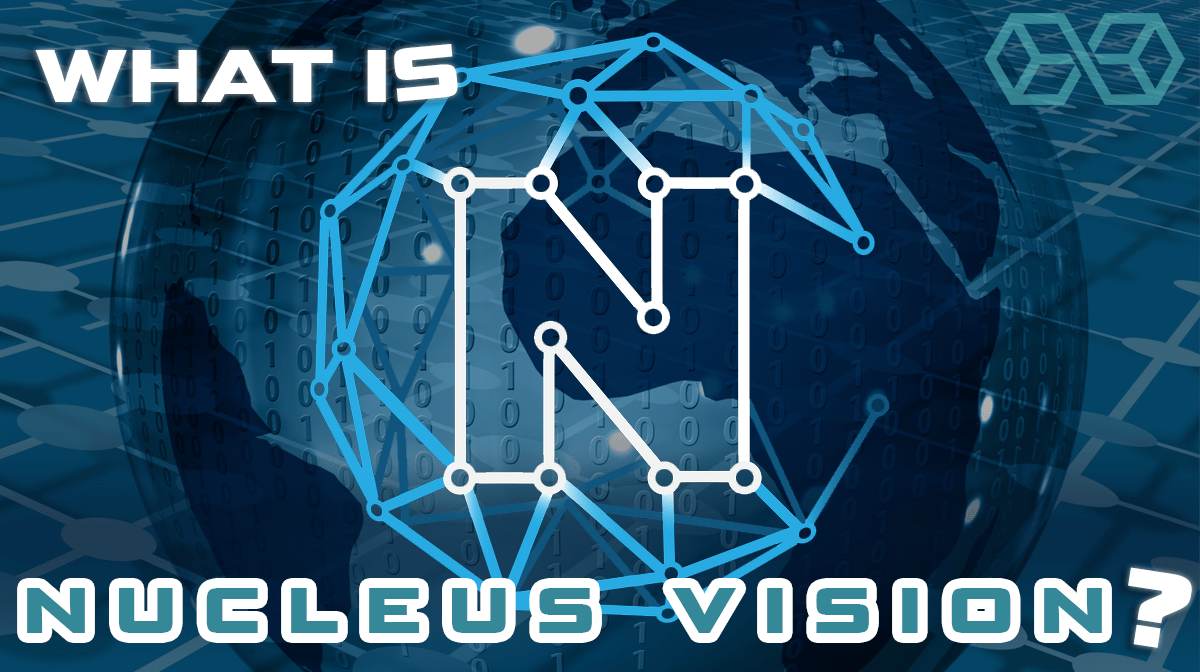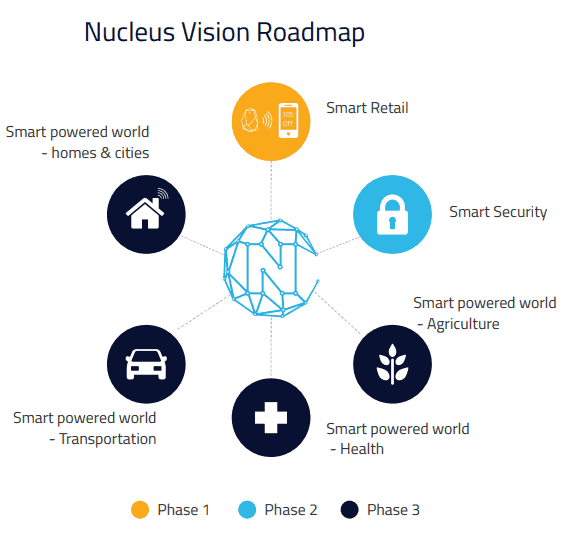In the era of big data and omnipresent smartphones, advertising has become scarily targeted and personalized. Data privacy has become a big concern, which is why one persistent conspiracy theory is that Facebook is eavesdropping on you to target you with ads. Google may also be doing the same thing.
One form of targeted advertising that has been around for many years is the use of loyalty and rewards program. Sure, signing up for these programs and swiping your loyalty card before every purchase might earn you the chance to redeem some cool stuff. But what you’re giving these stores in return is something far more valuable, your data.

The loyalty rewards market is vast. According to Orbis Research, the global loyalty management market was valued at $1.94 billion in 2016. By 2022, it’s expected to reach $7.31 billion, a compound annual growth rate of 24.7%.
It is this market that Nucleus Vision is currently targeting. The company’s goal is to create a blockchain-based upgrade to the current loyalty program modus operandi. The idea is to create a solution that respects the customer’s privacy and benefits retailers.
Unlike most blockchain projects, Nucleus Vision is more than just a blockchain platform. Its core product is first and foremost physical technology. But it is how Nucleus Vision connects all its components, including its blockchain platform, which makes it unique. Let’s examine each element.
The Four Components of Nucleus Vision
ION – The Proprietary Sensor
This is the jewel that enables the whole Nucleus Vision ecosystem to work. And it has nothing to do with blockchain at all. The ION sensor is Nucleus Vision’s proprietary sensor network. This device, according to the company, can identify a customer within a 200m radius. It can sense temperature, motion, pressure, sound, and acceleration.

More importantly, the ION sensor is also able to detect the customer’s mobile phone ID, and apparently, the phone number as well. This enables Nucleus Vision to send said customer’s phone a text message offering them the chance to sign up for Nucleus Vision. Further, the ION sensor does not rely on Wi-Fi, Bluetooth, GPS, or any pre-installed app for it to detect a customer’s phone.
How the ION sensor does this has not (and probably will not) be released by Nucleus Vision, who are trying to patent this technology. But it probably requires partnerships with telco providers.
NEURON – The Deep Learning Platform
This is Nucleus Vision’s analytics engine that captures and analyzes the data provided by the ION sensor. In its light paper, the company mentions that NEURON can connect retailers and customers at the precise moment when they would be the most receptive.

This ‘precise timing’ feature probably explains why the ION sensor doesn’t just detect the customer’s mobile phone. Its other features allow the sensor to pick up precisely where the customer is in the store (and also guess what he or she is doing) and deliver the offer at a precise moment based on some algorithm.
As Nucleus Vision expands to include more than just retail, the NEURON platform will likely continue to be upgraded to cater for the various industries that Nucleus Vision is targeting.
ORBIT – The Blockchain Platform
In the Nucleus Vision ecosystem, its blockchain platform, called ORBIT, is where all the customer data is stored.
nCash – The Utility Token
nCash is the ERC20 token that powers the Nucleus Vision ecosystem. Here’s how the nCash token will be used as an incentive:
- When a customer chooses to opt-in, they are rewarded with nCash.
- Retailers can share customer data information with each other in return for nCash.
- Customers can elect to share further data in exchange for nCash.
- Customers can use nCash as loyalty reward points in participating retail partners.
- Retailers can offer nCash tokens to customers at any point while they’re in the store to incentivize increased visits, conversions, or retention.
- nCash tokens will be able to be exchanged for cash on crypto exchanges.
The total supply of nCash tokens will be 10 billion. These tokens are non-mineable, and the 10 billion cap will not be exceeded.
Nucleus Vision in Action
You might find it a little difficult to envision how Nucleus Vision works just by reading about its four components. The retail process, flow below should help clarify things.
- A customer walks into a Nucleus Vision participating store, and the ION sensor recognizes his or her phone.
- The customer receives a text message (or push notification via pre-installed partner app) offering nCash in exchange for opting-in to the store’s reward program.
- If the customer opts-in, nCash is credited to his or her account, and customer identification data is transferred to the retailer via Orbit blockchain.
- If the retailer has no existing customer data or history with this particular customer, Nucleus Vision automatically requests said data (if any) from other participating Nucleus Vision partners and retailers. nCash is the incentive to share this data.
- If the other partner retailers agree to share this data, Nucleus Vision first asks for authorization from the customer before sharing it. Again, nCash is provided as the incentive.
- NEURON generates a unique score based on the customer’s data that represents the customer’s value to the retailer. This data is based on purchase history and spending habits, among other factors.
- Based on the said score, the retailer can opt to offer the customer more nCash if it feels that it would be a good deal.
Consumer Privacy Concerns
Nucleus Vision has the ability to send you potentially unwanted text messages straight to your phone. It can track your location within a store. Your data could be shared across dozens or hundreds of retailers.
With this sort of ability, consumer privacy protections concerns naturally come to mind. However, with the customer having to agree at every point of data sharing and being rewarded for doing so, this model is an upgrade from the current business model. After all, how do you know what CVS or Target is doing with the data from its loyalty programs?

What is more concerning is whether any regulations may impact Nucleus Vision’s business model. If sending intrusive text messages were suddenly against regulations, the whole concept would be in jeopardy.
Nucleus Vision appears to be mitigating this risk by partnering with various telco providers. Currently, it claims to have partnered with Vodafone, Reliance Communications, and Idea Cellular. But as Nucleus Vision expands to even more stores and awareness increases, there is still a risk that these telco providers may face consumer backlash and terminate the partnership as a result.
Nucleus Vision’s Current Status and Development Roadmap
At this point of writing, Nucleus Vision states that its technology is live in 10 retail stores in India. So far it has also made 53,807 unique identifications, 2,306 successful authorizations (a 4.3% conversion rate if you’re curious), 2,416 sent offers/recommendations, and 1,818 offers availed. You can view its live data feed here.

In 2018 and 2019, Nucleus Vision plans to continue to scale its retail product across the world while increasing the number of telco partnerships. Its ambitious roadmap, which calls for 5,000 ION sensors deployed by the end of 2018, and 130,000 by the end of 2019, can be viewed here. Over the even longer term, Nucleus Vision also plans to expand its business model to areas other than retail such as transportation, health, and agriculture.
The Team behind Nucleus Vision
The Nucleus Vision website states that the project was “incepted at Harvard,” which actually means that its founder dropped out of Harvard Business School. The Nucleus Vision team is based out of India and America. Out of its 40 members, there are nine blockchain developers, five data scientists, 1 IoT platform architect, five marketing experts, nine engineers, and 11 operations professionals; a good mix.
Its advisory team and early investors are also encouraging, counting among them Tim Draper, co-founders of Intel Capital, and Reliance Capital.
Nucleus Vision’s ICO Raises $40 Million
Nucleus Vision’s token sale ended on January 28, 2018, successfully raising $40 million. The hard cap for the token sale is $40 million, and payment was only in ETH.
What are the Short Term and Long Term Potential of Nucleus Vision?
Nucleus Vision is indeed an exciting project, but it doesn’t seem to be generating that much buzz despite already having a live working product. This may be because these stores are right now all in India. However, the company has also not released proof of the product working, and we have to take them at their word.

In the short term, this lack of buzz may impact Nucleus Vision’s chances of hitting its ICO target. But as the ICO date is not finalized, Nucleus Vision may very well be planning a marketing blitz prior to announcing the ICO. If this happens, this would be a definite boon for the ICO’s chances.
In the long-term, Nucleus Vision has identified a unique solution to the current outdated loyalty program model. One long-term concern is the consumer backlash against telco providers if Nucleus Vision does not properly manage how intrusive its forced mobile phone notifications are. Further, Nucleus Vision’s business model would only work with large-scale adoption; failure to reach critical mass may cause the project to fall flat.
Have you heard of Nucleus Vision before reading this article? What do you think of its ICO prospects and long-term business model? Let us know your views in the comments below.
References
Who is Tim Draper?
What is Data Privacy?

![A Beginner’s Guide to Monero – What Is XMR? [Updated 2023]](https://cd.blokt.com/wp-content/uploads/2019/04/Beginners-guide-to-Monero-2-218x150.png)

![Best 5 Bitcoin Sports Betting Sites [2023] (Analyzed & Approved) Best Bitcoin Betting Sites](https://cd.blokt.com/wp-content/uploads/2020/05/best-bitcoin-betting-sites-218x150.png)

